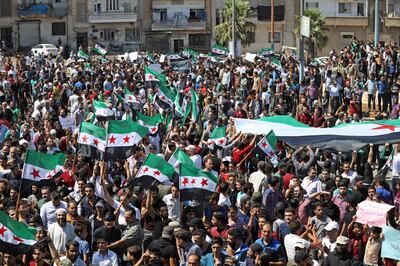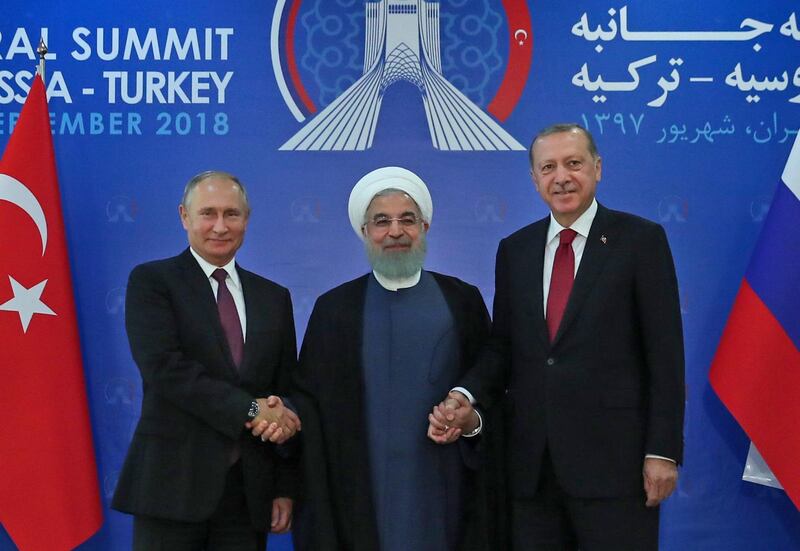The presidents of Iran, Russia and Turkey met Friday to discuss the future of Syria as a bloody military operation looms in the last rebel-held area of the war-ravaged nation, urging militants to lay down their weapons.
Turkish President Recep Tayyip Erdogan called for a ceasefire and an end to airstrikes in the north-western province of Idlib, something that was not immediately accepted by Russian President Vladimir Putin and Iranian President Hassan Rouhani.
Instead, Mr Putin warned that militants in Idlib planned "provocations", possibly including chemical weapons. The Syrian government has been repeatedly accused of using chemical weapons in the long conflict.
For his part, Mr Rouhani demanded an immediate withdrawal by American forces in the country. The US has about 2,000 troops in Syria.
He said "we have to force the United States to leave" without elaborating.
"The fires of war and bloodshed in Syria are reaching their end," Mr Rouhani said, while adding that terrorism must "be uprooted in Syria, particularly in Idlib."
Each of the three nations has its own interests in the years-long war in Syria.
Iran wants to keep its foothold in the Mediterranean nation neighbouring Israel and Lebanon. Turkey, which backed opposition forces against Syrian President Bashar Al Assad, fears a flood of refugees fleeing a military offensive and destabilising areas it now holds in Syria. And Russia wants to maintain its regional presence to fill the vacuum left by America's long uncertainty about what it wants in the conflict.
North-western Idlib province and surrounding areas are home to about 3 million people — nearly half of them civilians displaced from other parts of Syria. That also includes an estimated 10,000 hard-core fighters, including Al Qaeda-linked militants.

For Russia and Iran, both allies of the Syrian government, retaking Idlib is crucial to complete what they see as a military victory in Syria's civil war after Syrian troops recaptured nearly all other major towns and cities, largely defeating the rebellion against Mr Al Assad.
A bloody offensive that creates a massive wave of death and displacement, however, runs counter to their narrative that the situation in Syria is normalising, and could hurt Russia's longer-term efforts to encourage the return of refugees and get Western countries to invest in Syria's postwar reconstruction.
For Turkey, the stakes could not be higher. Turkey already hosts 3.5 million Syrian refugees and has sealed its borders to newcomers. It has also created zones of control in northern Syria and has several hundred troops deployed at 12 observation posts in Idlib. A government assault creates a nightmare scenario of potentially hundreds of thousands of people, including militants, fleeing toward its border and destabilising towns and cities in northern Syria under its control.
Naji Al Mustafa, a spokesman for the Turkey-backed National Front for Liberation, said Friday his fighters were prepared for a battle that they expect will spark a major humanitarian crisis.
"The least the summit can do is to prevent this military war," he said.
_______________
Read more:
[ US has seen evidence of Syria preparing chemical weapons in Idlib: envoy ]
[ US sanctions Syrian and Lebanese nationals supporting Assad ]
[ Idlib residents flee ahead of feared Syrian government offensive ]
_______________
Early on Friday, a series of air strikes struck villages in south-west Idlib, targeting insurgent posts and killing a fighter, said Rami Abdel Rahman, the head of the Britain-based Syrian Observatory for Human Rights. Russian warplanes are suspected to have carried out the attack, he said.
Turkey also does not want to see another Kurdish-controlled area rise along its border, as it already faces in northern Iraq.





